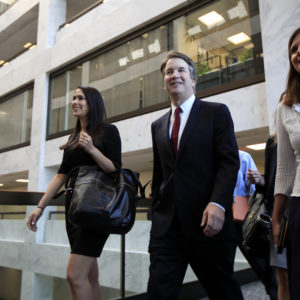Chuck Grassley, chairman of the Senate Judiciary Committee, has pledged to hold open, fair, and thorough hearings to consider the nomination of Judge Brett Kavanaugh to the Supreme Court. Unfortunately, opponents of Judge Kavanaugh have taken this good faith approach as an opportunity to seek documents that have little connection to the judge’s qualifications. As a result, Senator Grassley expects hearings to occur in September and a Senate vote in October.
The primary reason for the delay is the Senate Democrats’ demands to see every piece of paper Judge Kavanaugh has ever touched while a federal employee, something he has been for 25 out of the last 28 years. It’s a long paper trail. He has served as a federal judge on the D.C. Circuit Court of Appeals for the last 12 years. Before that, he served as a White House counsel and staff secretary to President George W. Bush. As the staff secretary, his job was to coordinate the flow of paper from government departments and agencies to the president’s desk. For the most part, he was not the author of these documents, he was the person making sure they were seen and acted upon by the president. But, his opponents are anxious to get them – all one million pages.
Why look at documents that offer limited to no insight on Judge Kavanaugh’s fitness to join the Supreme Court? Because his opponents are struggling to find a good reason to object to his fitness for the job. Look at his track record. He took undergraduate and law degrees from Yale. He clerked for prominent federal court judges, including retiring Justice Anthony Kennedy. He spent time at the Solicitor General’s Office of the U.S. Department of Justice. He was an associate counsel for Ken Starr’s Whitewater investigation. As mentioned, he was a White House counsel and has spent the last 12 years on the federal bench. His opinions have influenced decisions by the Supreme Court and federal courts around the country. His law clerks have gone on to clerk for Supreme Court justices. There are no question marks around his qualifications and no holes in his background.
Thus far, it appears there are two objections to Judge Kavanaugh. First, he takes a textualist approach when applying the Constitution and statutes to the cases that come before him. Second, he bought baseball tickets with a credit card. The first objection is wrong-headed. Taking the text of the law seriously is exactly what a good judge does. A judge should never substitute his or her views for the law as it is written in the Constitution or the statutes. To do otherwise upsets the careful balance of power that is distributed amongst the three branches of government. As we learned in civics class, Congress (not the courts) makes the law, the Executive executes the law, and the Courts apply the law. The second objection of having a fondness for baseball is silliness on stilts. Judge Kavanaugh’s appreciation for America’s pastime is further evidence of his fitness for the highest court.
There’s an old saying among lawyers that goes like this: when the law is on your side, argue the law; when the facts are on your side, argue the facts; when neither is on your side, just argue. Judge Kavanaugh’s opponents seem to be following the “just argue” approach, but there isn’t much logic to it. Judge Kavanaugh is an outstanding judge who is held in high regard by his peers. He possesses impeccable credentials, and he has led a life of integrity in both the professional and personal spheres. Those are the factors Senators should consider in deciding whether to vote for or against Judge Kavanaugh. Justices Breyer, Ginsburg, Kagan, and Sotomayor received between 63 and 96 votes in favor of their nominations. Judge Kavanaugh deserves the same, strong bipartisan support. Tell your Senators to get on with it.

